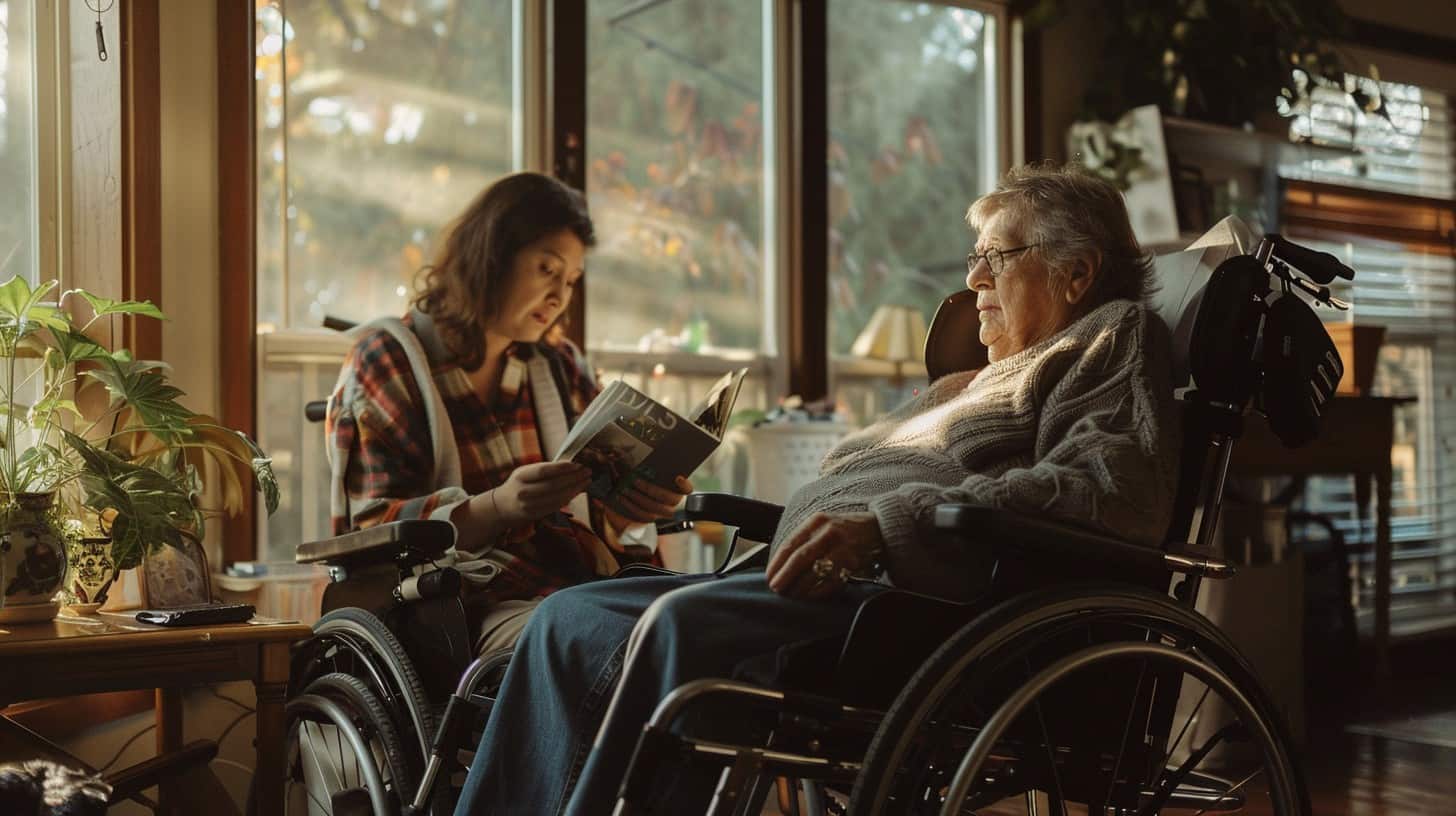Caring for a disabled adult at home can feel like you’re trying to solve a puzzle with missing pieces. Did you know, in 2021, the cost of nonmedical in-home care hovered around $26 an hour? This article shines a light on how to enhance the quality of life for your loved one without breaking the bank.
Stick around, this might just be the guide you’ve been looking for…
Key Takeaways
Home care for disabled adults brings independence and comfort, covering needs from meal prep to medication management.
Financial aid like Medicare, Medicaid, and PACE can ease the costs of in-home care, which was around $26 an hour in 2021.
Services available at home range from nursing care to personal aides, helping with everything from medical needs to daily chores.
When choosing the right care, consider personal needs, explore all financial options, and ensure it can adapt over time.
Balancing caregiving with one’s own life requires understanding the loved one’s world, ensuring safety at home, and using technology for assistance.
Table of Contents
Understanding Home Care for Disabled Adults
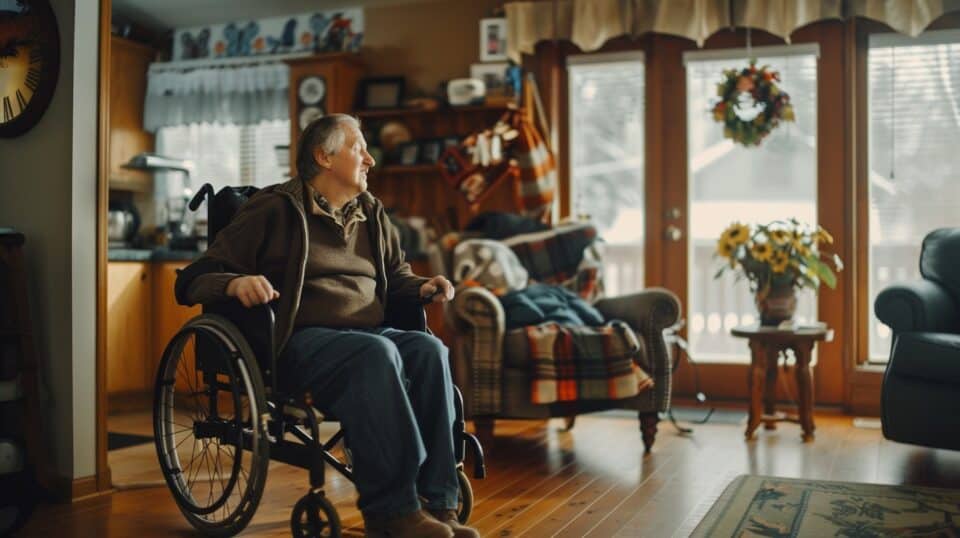
Home care for disabled adults offers more than just assistance—it brings independence and comfort right to their living room. This kind of care adapts as needs change, ensuring a snug fit between the person and their environment.
Imagine being able to stay in the place you love, surrounded by memories and personal touches, with support tailored exactly to your needs. From meal prep to medication management, home care covers it all.
Let’s face it; every home is different—just like every need is unique. Home modifications may be part of the plan for safer mobility at home. Think stair lifts from companies like LifeCare Mobility, or bathroom grab bars that prevent falls.
Add professional caregivers into the mix—with skills ranging from basic companion care to skilled nursing—and you’ve got a recipe for thriving at home. Oh, and let’s not forget about those lovely formalities such as applying for financial help through Medicare or Medicaid…
They might sound tedious but can significantly ease off expenses related to at-home care services.
Benefits of Home Care for Disabled Adults
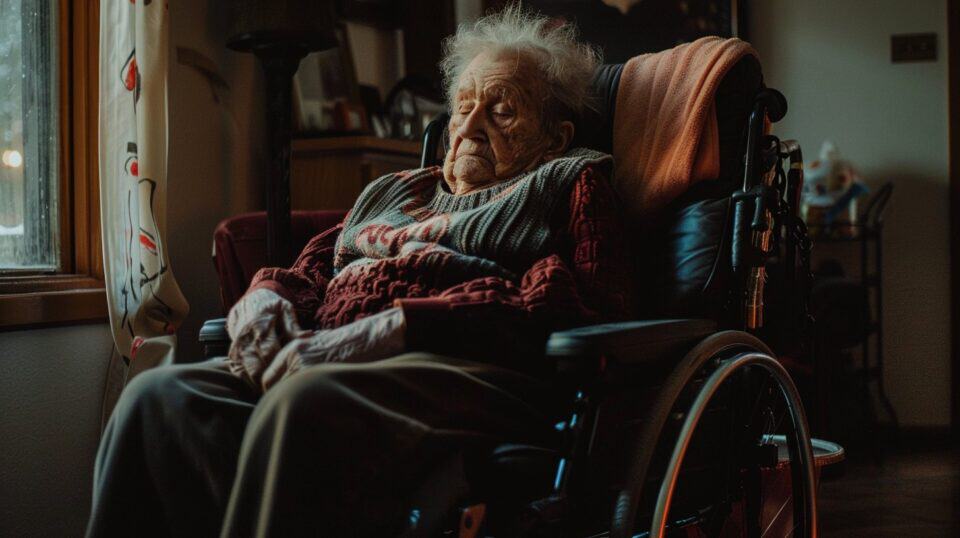
Home care kicks loneliness to the curb and lets happiness in through the front door. It’s like having a personal cheerleader, making life not just bearable but enjoyable for disabled adults…
Improved Quality of Life
Staying at home means more than just comfort; it’s about keeping those coffee-fueled mornings and late-night TV shows rolling. It’s where disabled adults can hit their favorite chair, enjoy the garden blooms, or whip up a midnight snack in their own kitchen.
Imagine the warmth of familiarity – like wearing that old, cozy sweater on a chilly day. It’s this sense of belonging and independence that ramps up the quality of life big time.
Now, toss in safety measures, adaptions for ease around the house – think grab bars and ramps – and you’ve got a recipe for living well. Regular visits from healthcare providers keep health issues in check without stepping out.
Plus, personal goals don’t get shoved to the back burner; they’re front and center with tailored plans focusing on everything from physical health to mental wellness. Ready to dive deeper? Up next: personalized care that fits like your favorite pair of jeans….
Personalized Care
Caring for a disabled adult at home is like tailoring a designer outfit—it needs to fit just right. You wouldn’t wear your sister’s dress to your anniversary dinner if it didn’t hug you in all the right places, would you? The same goes for personalized care plans.
They take the puzzle pieces of appointments, household chores, and personal care tasks and put them together in a way that suits the individual—like finding that perfect dress.
Imagine running a marathon without training—tough, right? That’s what it can feel like for disabled adults trying to navigate life without personalized care. But with services tailored to their specific needs and preferences—we’re talking about everything from meal prep to managing medication—they don’t just get by; they thrive.
And let’s not forget independence. It’s precious, like that first sip of coffee in peace before everyone else wakes up. With support from programs such as Medicare or Medicaid—and even some designed specifically for elderly care—isn’t it comforting to know there are options out there ensuring our loved ones lead happy and healthy lives while staying where their hearts are… at home?
Cost-Efficiency
Home care isn’t just about comfort; it’s smart for your wallet, too. Imagine this: the cost of in-home care hovered around $26 to $27 an hour in 2021. Sounds steep? Think again. This option can be far more affordable than round-the-clock nursing home care or specialized residential facilities.
Plus, with programs like Medicare, Medicaid, and PACE stepping up to bat, financial burdens lighten considerably. These programs offer a lifeline by covering some costs for adults with disabilities needing at-home services.
Diving deep into available funds can turn what seems like a dizzying expense into something manageable. It’s all about knowing where to look and using every resource at your disposal – from government aids to local support networks that reduce out-of-pocket expenses significantly…
Now let’s peek into what types of at-home services are accessible for those needing extra help day-to-day.
Available At-Home Services for Individuals with Disabilities
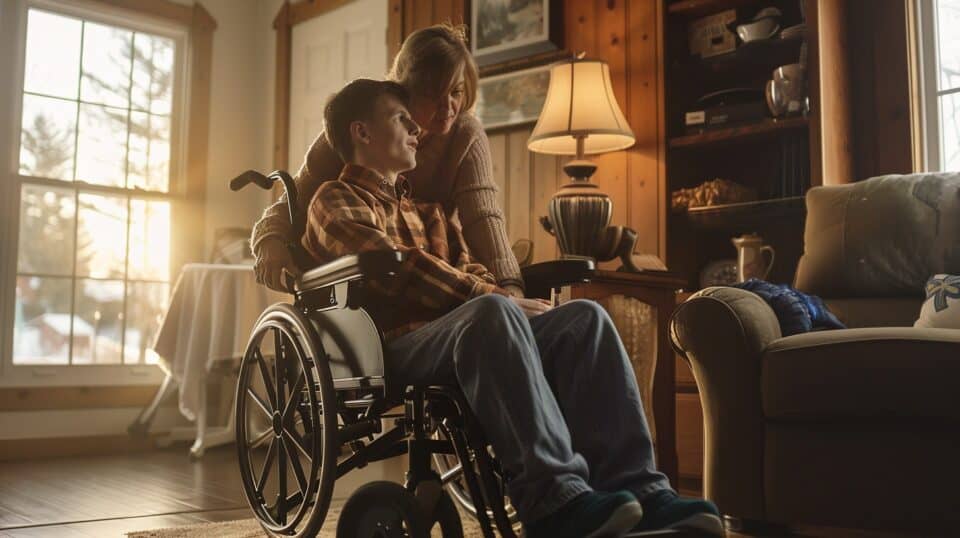
Caring for a loved one with disabilities at home can be both rewarding and challenging. Lucky for us, there’s a whole suite of services out there to lighten the load and brighten their day. Here’s the lowdown:
- Nursing care kicks things off by bringing medical expertise right to your doorstep. Imagine having someone who can handle wound dressings, administer medications, and monitor health conditions without you having to transform your living room into an episode of “ER.”
- Occupational therapy comes next with its bag of tricks to improve daily life. This is where your loved one learns clever ways to dress, eat, or even play card games despite hurdles they face. It’s like having a life coach but with more medical equipment.
- Physical therapy steps in to keep the body moving. Whether it’s recovering from a fall or just stretching those stiff muscles, these pros work miracles on mobility—one step at a time.
- Meal preparation services are godsend angels for those times when cooking feels like rocket science. Balanced meals show up at your door, making sure nutrition is on point, without you needing to become a master chef overnight.
- Respite care throws caregivers a lifeline by stepping in so you can take that much-needed break. Think of it as pressing the pause button on caregiving duties while someone else takes over—perfect for catching your breath or binge-watching that series everyone’s talking about.
- Speech therapy adds its voice to the mix by helping overcome communication barriers. It’s especially great when words don’t flow easily or swallowing becomes an obstacle course.
- Home modification services do a makeover on your space, turning it into disability-friendly territory. Ramps replace steps; grab bars appear in bathrooms—suddenly, every corner says “Welcome!”
- Personal care aides are the unsung heroes helping with bathing, dressing, and keeping up appearances, so dignity stays intact alongside hygiene.
- Transportation services ensure doctor visits and social outings aren’t missed because nobody wants cabin fever setting in.
- Housekeeping assistance keeps dust bunnies at bay when energy levels dip too low for chores.
- Lastly, adult day care offers a change of scenery filled with activities and socializing because variety is indeed the spice of life.
Each service wraps around your family’s needs like a cozy blanket, offering support that ranges from medical wizardry to making sure life remains as delightful as possible—even amidst challenges. So breathe easier, knowing these helping hands are just around the corner!
Financial Assistance Programs for In-Home Care
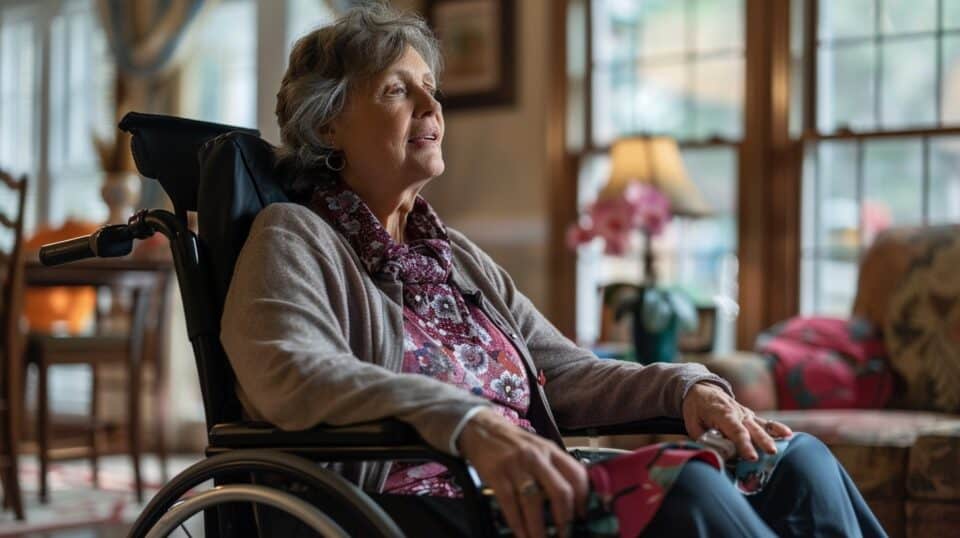
Paying for in-home care can feel like a heavyweight—trust me, I know. But here’s the scoop: there are programs out there ready to lift some of that burden off your shoulders. Medicare, Medicaid, and the Program of All-Inclusive Care for the Elderly (PACE) come to mind.
Yes, dealing with paperwork feels as fun as watching paint dry. Yet, these programs could be your ticket to affordable care for your loved one.
Did you know the median cost of nonmedical in-home care was about $26 to $27 an hour back in 2021? Sounds steep! But before you start selling off family heirlooms or considering a second mortgage, dive into what these financial aid programs offer.
With a bit of legwork—and maybe a strong cup of coffee—you might just find that making ends meet is not as hard as it seems. So roll up those sleeves and get ready to explore options that bring both relief and quality care right into your home.
When to Seek Professional Home Care
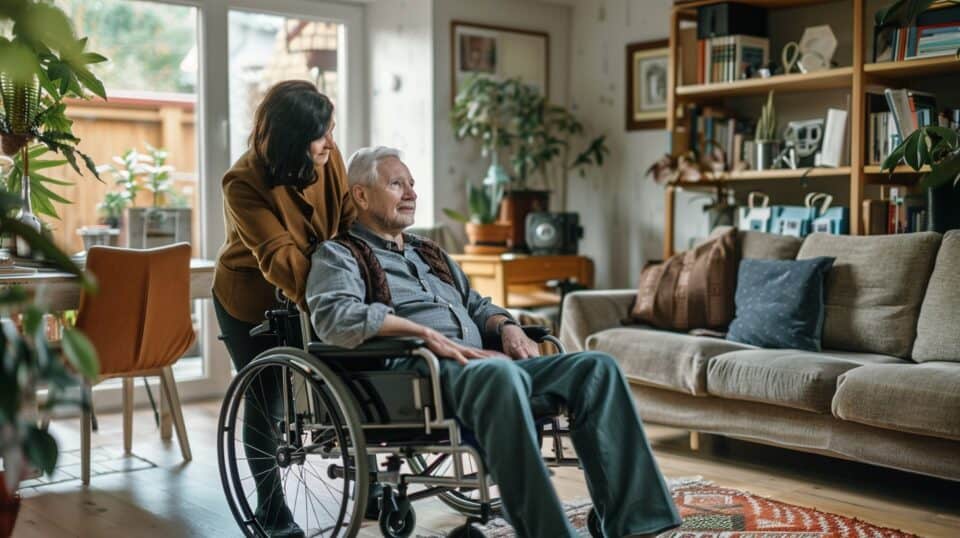
Deciding to get professional home care is a big step. It might be time if managing appointments, household chores, and personal tasks become overwhelming for both of you. It’s all about finding balance and making sure your loved one stays comfortable and independent at home.
Or maybe their needs have grown, things like safety, comfort, or just needing more help around the house are flashing signs it’s time to call in the pros.
It’s not an easy decision—and nobody expects it to be. If your loved one starts requiring help with daily living activities—think bathing, dressing, or even moving around—it could signal that extra support is necessary.
And let’s face it; sometimes we need a bit of backup to provide the best care possible while still keeping our sanity intact. After all, being there for them doesn’t mean doing it all alone; exploring options can open doors to better health and happiness for everyone involved.
How to Choose the Right Care for Disabled Adults
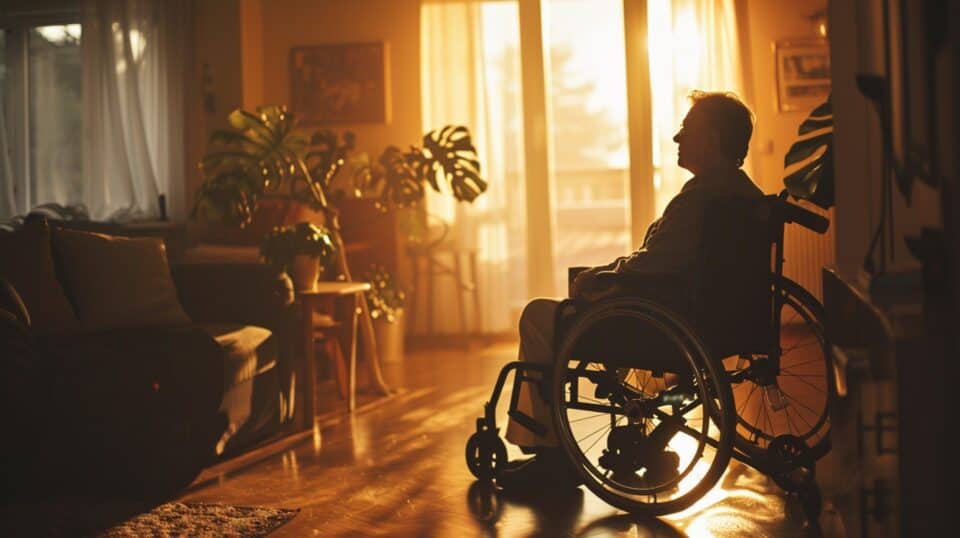
Choosing the right care for a disabled adult is like picking out the perfect pair of shoes. It has to fit just right, feel comfortable, and support them wherever they go. Here’s how you can tie those laces snugly:
- Get to know their needs intimately. Every person is different, and what works for one might not work for another. Consider whether they need help with personal hygiene, medication management, or mobility.
- Tour facilities and meet caregivers if considering residential care. You want a place that feels like home, not just looks like it. Pay attention to how staff interact with residents and ask about activities that keep everyone engaged.
- Dive deep into home health care versus nonmedical care options. Some folks need a registered nurse; others just need help running errands or cooking meals.
- Check out financial options carefully. Home care can be costly — remember, we’re talking about $26 to $27 an hour in 2021! Look into Medicare Part A, Social Security Disability Insurance (SSDI), or even long-term care insurance.
- Ask around for recommendations, like you would for a good mechanic or hairdresser. Friends, family caregivers, or healthcare professionals often know the best spots in town.
- Think about flexibility and future needs because life loves throwing curveballs! Make sure whatever option you choose can adapt as your loved one’s needs change over time.
- Finally, listen to your gut … and theirs! If something feels off during a visit or meeting, it probably is. And equally important – make sure your loved one is on board with the decision too.
Now that we’ve got choosing the right care ticked off our list…
Tips for Caring for Adults with Disabilities at Home
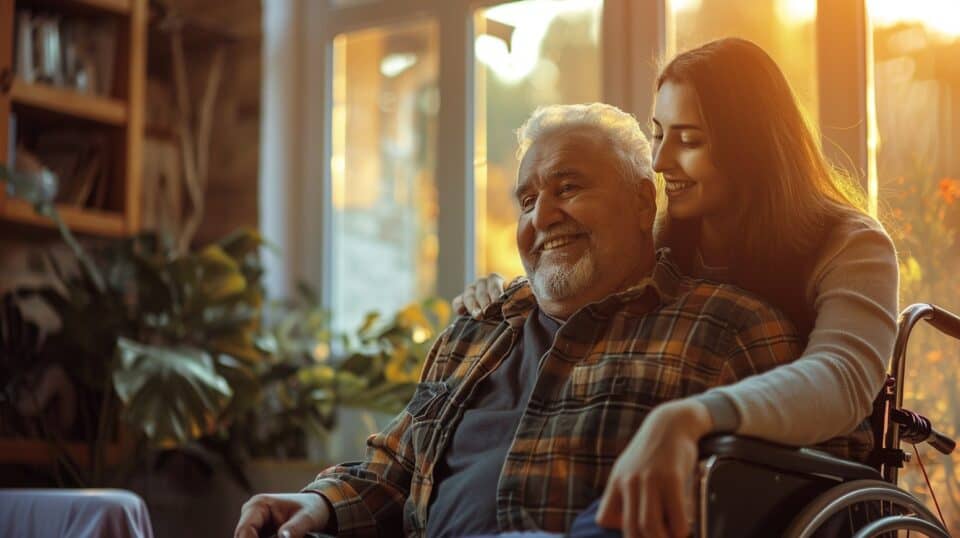
Caring for an adult with disabilities at home can be both rewarding and challenging. The key is finding the right balance to enhance their quality of life while managing your own.
- Dive deep into their world, understand what makes them happy or anxious. This insight helps adapt the home environment to suit their needs better.
- Keep safety first, always. Whether it’s installing grab bars in the bathroom or ensuring pathways are clear of obstacles, make sure your home is a secure haven.
- Personalize care by focusing on what they can do rather than what they can’t. Celebrate small victories together; it boosts morale like nothing else.
- Routine rocks! Establishing a daily schedule helps reduce anxiety for people with disabilities and brings a comforting predictability to their day.
- Mix in medical appointments with fun outings. Life shouldn’t be all about health services; balance doctor visits with trips to a favorite park or café.
- Encourage independence in activities of daily living as much as possible. It fosters self-confidence and empowers them in amazing ways.
- Communication is king… or queen! Always keep the lines open, listening actively and speaking clearly, whether they’re verbal or nonverbal communicators.
- Seek social support not just for them, but for you too. Join groups, find others in similar situations, and share experiences—it lightens the load.
- Make use of available technology—assistive devices can transform lives by improving mobility or simplifying communication.
- Never underestimate the power of laughter; it’s often the best medicine.
Managing these tasks along with household chores requires patience and love, but remember you’re not alone—resources and communities exist to support you through this journey.
FAQs About Caring for Disabled Adults at Home
How can I make my home a happy place for an adult with disabilities?
Turning your home into a cozy nest isn’t just about fluffing pillows; it’s about creating an environment where everyone feels welcome and understood. From installing grab bars in the shower to setting up regular date nights at home, every little change helps. Think of your house as a giant hug, ready to comfort and support.
What should I do if I feel like I’m on an island caring for my loved one?
Feeling more isolated than a deserted island castaway? You’re not alone. Reach out to care advisors or join support groups where you can share stories, swap tips, and maybe even laugh over shared experiences. Remember, it’s okay to ask for help – it doesn’t mean you’re waving the white flag; it means you’re smart enough to know when you need backup.
Can exercise really help adults with physical disabilities?
Absolutely! Think of exercise as the secret sauce that keeps the body moving and grooving. Whether it’s stretching exercises that could rival Gumby or using assistive technologies for a workout session – getting active is key. It boosts mood faster than eating ice cream on a hot day!
Why are social connections important for disabled adults?
Imagine life without chats over coffee or belly laughs with friends—it sounds pretty dull, right? For disabled adults, having strong social ties is like sunshine after rain; essential for emotional health and resilience against feeling blue.
How do I ensure good mental health while caring for someone with disabilities?
Caring is an art form that requires painting outside the lines sometimes—especially when it comes to mental health! Mix regular therapy sessions into your routine like adding sprinkles to ice cream: they might seem small, but they make everything better! Don’t forget self-care, too; think of yourself as a smartphone that needs recharging regularly.
Is there any technology that can make caregiving easier?
Welcome to the future, where assistive technology isn’t just cool gadgets from sci-fi movies—they’re real-life helpers making daily tasks smoother than butter on toast! From manual wheelchairs navigating through tight spaces like ninja warriors, to voice-activated devices keeping everyone connected—technology brings independence within reach.
